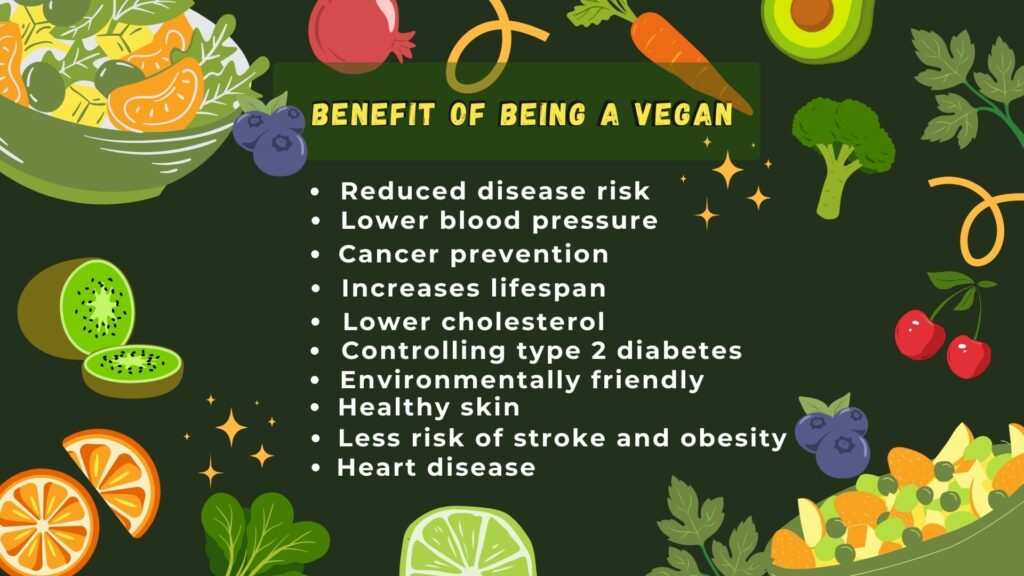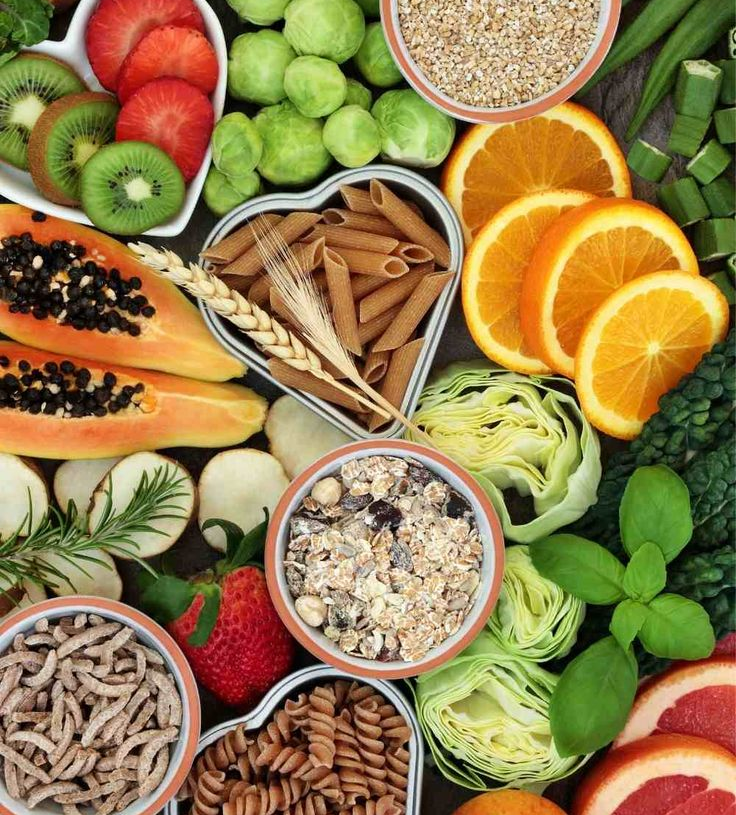
A vegan lifestyle, characterized by a diet that excludes all animal products (meat, dairy, eggs, and sometimes honey), can reduce the risk of several diseases due to its focus on plant-based foods that are rich in nutrients, fiber, and antioxidants. Here’s how adopting a vegan lifestyle can help:
1. Heart Disease
- Lower Cholesterol and Blood Pressure: Vegan diets are typically low in saturated fats and cholesterol. Plant-based foods like fruits, vegetables, whole grains, nuts, and seeds are naturally heart-healthy.
- Rich in Heart-Healthy Nutrients: Vegan diets are high in antioxidants (from fruits and vegetables) and healthy fats (from sources like avocados and nuts), which improve cardiovascular health.
- Reduced Inflammation: Plant-based diets lower inflammation, reducing the risk of atherosclerosis.
2. Type 2 Diabetes
- Improved Insulin Sensitivity: Vegan diets improve how the body processes sugar, thanks to high fiber content and low glycemic index foods like whole grains and legumes.
- Lower Body Weight: Vegan diets are often associated with lower calorie intake, which can help with weight management, a key factor in preventing diabetes.
- Prevention of Insulin Resistance: Avoiding animal fats can reduce the risk of developing insulin resistance.
3. Cancer
- Rich in Phytochemicals: Vegan diets are high in plant compounds like flavonoids, carotenoids, and polyphenols, which have cancer-protective effects.
- Lower Red and Processed Meat Consumption: The absence of processed and red meat reduces exposure to carcinogens such as heterocyclic amines and nitrosamines.
- High Fiber Intake: Fiber-rich diets are associated with a reduced risk of colorectal cancer.
4. Obesity
- Lower Caloric Density: Plant-based foods are typically lower in calories but high in nutrients, which helps in maintaining a healthy weight.
- Increased Satiety: High fiber content keeps you full longer, reducing overall calorie consumption.
5. Hypertension
- Potassium-Rich Foods: Fruits and vegetables are high in potassium, which helps lower blood pressure.
- Low Sodium: Vegan diets tend to avoid processed foods that are high in salt, reducing hypertension risk.
6. Osteoporosis
- Alkaline-Forming Foods: Fruits and vegetables promote an alkaline environment in the body, which protects bone health.
- Avoidance of Excess Protein: Diets high in animal protein can lead to calcium loss from bones; a plant-based diet avoids this issue.
7. Gut Health
- Increased Fiber Intake: A vegan diet promotes a diverse and healthy gut microbiome, reducing the risk of digestive disorders.
- Reduced Risk of Diverticular Disease: High fiber consumption from legumes, whole grains, and vegetables lowers the risk of this common condition.
8. Kidney Disease
- Lower Protein Load: Plant proteins are less taxing on the kidneys compared to animal proteins.
- Reduced Risk of Chronic Conditions: By lowering the risks of hypertension and diabetes, vegan diets indirectly protect kidney function.
9. Autoimmune Disorders
- Anti-Inflammatory Effects: Vegan diets are rich in anti-inflammatory foods, which may help in managing or reducing the risk of autoimmune diseases.
Key Considerations
While a vegan lifestyle has significant health benefits, it’s essential to ensure balanced nutrition by including:
- Vitamin B12 supplementation (not found naturally in vegan foods).
- Sufficient intake of omega-3 fatty acids (from flaxseeds, chia seeds, or algae-based supplements).
- Adequate levels of calcium, iron, and protein through diverse plant sources.
A well-planned vegan diet combined with a healthy lifestyle (exercise, stress management, and adequate sleep) can significantly reduce the risk of chronic diseases while promoting overall well-being.
A vegan lifestyle is considered environmentally friendly because it reduces the strain on natural resources and minimizes the environmental impact of food production. Here’s how a vegan lifestyle benefits the planet:

1. Lower Greenhouse Gas Emissions
- Animal Agriculture: Livestock farming is a major contributor to greenhouse gas emissions, producing methane (from cattle digestion), nitrous oxide (from manure), and carbon dioxide (from land-use changes and transportation).
- Plant-Based Diets: Producing plant-based foods generates significantly fewer emissions. For instance, growing lentils, beans, and grains emits far less CO₂ than raising livestock.
2. Reduced Land Use
- Deforestation: Vast areas of forests are cleared for grazing livestock or growing feed crops, leading to habitat loss and biodiversity decline.
- Efficient Land Use: Growing plants for direct human consumption requires much less land than producing meat, as animals consume large amounts of feed over their lifetimes.
3. Water Conservation
- Animal Agriculture Water Demand: Producing meat and dairy requires significant water resources. For example, it takes approximately 1,800 gallons of water to produce 1 pound of beef.
- Plant-Based Foods: Growing crops like vegetables, fruits, and grains uses far less water, making a vegan diet much more water-efficient.
4. Lower Pollution Levels
- Water Pollution: Animal farming generates runoff containing manure, antibiotics, and chemicals, polluting water bodies and creating dead zones in oceans and rivers.
- Air Pollution: Methane from livestock and ammonia from manure degrade air quality. Vegan diets reduce demand for such practices, leading to cleaner air and water.
5. Biodiversity Protection
- Habitat Destruction: Animal farming is a leading cause of habitat destruction, threatening wildlife in areas like the Amazon rainforest.
- Lower Wildlife Exploitation: A vegan lifestyle supports biodiversity by reducing the need for land conversion and protecting ecosystems.
6. Reduction of Overfishing
- Marine Ecosystem Damage: Overfishing depletes fish populations, harms coral reefs, and disrupts marine ecosystems.
- Plant-Based Alternatives: Vegan diets eliminate reliance on fish, reducing the strain on marine environments and protecting aquatic species.
7. Energy Efficiency
- Animal Farming Energy Use: Raising livestock consumes more energy due to the resources needed for feed production, transportation, and processing.
- Plant Farming: Producing plant-based foods requires significantly less energy, making it a more sustainable option.
8. Mitigation of Climate Change
- Carbon Footprint: A vegan lifestyle dramatically reduces an individual’s carbon footprint. Studies suggest switching to a vegan diet can cut food-related greenhouse gas emissions by up to 73%.
- Soil Health: Plant-based agriculture, especially regenerative farming, can improve soil health and increase its carbon sequestration capacity.
9. Waste Reduction
- Animal Waste: Livestock produce vast amounts of manure, often more than can be safely managed, leading to pollution.
- Plant-Based Systems: Vegan diets generate less waste, and plant materials can often be composted or recycled into natural fertilizers.
10. Sustainable Food Systems
- Feeding More People: Growing crops for human consumption is more efficient than feeding them to livestock. A plant-based food system can support a larger population with fewer resources.
- Resilience to Climate Events: Plant-based agriculture is generally more adaptable to climate change than livestock farming, ensuring food security in a warming world.
Environmental Impact Comparisons
Studies consistently show that vegan diets have a significantly lower environmental footprint:
- A 2018 study in Science found that a global shift to vegan diets could reduce food-related greenhouse gas emissions by 49% and agricultural land use by 76%.
- Research in Nature Food revealed that plant-based diets require less water, land, and energy while emitting fewer pollutants.
Frequently Asked Questions (FAQ) About the Vegan Lifestyle
1. What is a vegan lifestyle?
A vegan lifestyle avoids all animal-derived products, not only in diet (meat, dairy, eggs, and honey) but often also in clothing, cosmetics, and other goods. It emphasizes using plant-based alternatives and avoiding practices that exploit animals.
2. Why do people choose to go vegan?
- Ethical Reasons: To prevent animal cruelty and exploitation.
- Health Benefits: For improved health, reduced risk of chronic diseases, and better overall well-being.
- Environmental Impact: To reduce their carbon footprint, conserve natural resources, and combat climate change.
3. Is a vegan diet healthy?
Yes, a well-planned vegan diet can provide all necessary nutrients and is associated with numerous health benefits, including a lower risk of heart disease, diabetes, and certain cancers. However, vegans need to ensure they get adequate vitamin B12, iron, calcium, and omega-3 fatty acids through fortified foods or supplements.
4. How do vegans get enough protein?
Protein can be obtained from:
- Legumes (lentils, chickpeas, black beans)
- Tofu, tempeh, and edamame
- Nuts and seeds (almonds, chia seeds, hemp seeds)
- Whole grains (quinoa, oats, brown rice)
- Plant-based protein powders for added convenience
5. Do vegans need supplements?
Vegans may need supplements or fortified foods for:
- Vitamin B12: Essential for nerve health and energy.
- Vitamin D: Important for bone health, especially in low-sunlight regions.
- Omega-3 Fatty Acids: Found in algae-based supplements.
- Iron and Calcium: Can be consumed through diet or supplements if necessary.
6. Is a vegan diet suitable for children and pregnant women?
Yes, with proper planning, a vegan diet can meet the nutritional needs of all life stages, including pregnancy, lactation, infancy, and childhood. It’s important to consult with a healthcare professional or dietitian to ensure balanced nutrition.
7. Is it expensive to go vegan?
Not necessarily. Staples like grains, legumes, fruits, and vegetables are often affordable. However, specialty vegan products (e.g., plant-based meats, cheeses) can be pricier. A vegan diet can be budget-friendly if focused on whole, unprocessed foods.
8. What are some common misconceptions about veganism?
- Vegan diets are protein-deficient: Vegans can easily meet protein needs through diverse plant foods.
- Vegan food is boring: Vegan cuisine is diverse and includes global flavors, from Indian curries to Mediterranean falafels.
- Vegans are always healthy: Veganism doesn’t guarantee health; a diet heavy in processed vegan foods can be unhealthy.
9. How do I start transitioning to a vegan lifestyle?
- Start with Meatless Mondays or similar initiatives.
- Replace animal products with plant-based alternatives (e.g., almond milk instead of cow’s milk).
- Experiment with new vegan recipes and cuisines.
- Gradually reduce animal products in your diet and lifestyle.
10. What are some vegan alternatives for everyday foods?
- Milk: Almond, soy, oat, or coconut milk
- Meat: Tofu, tempeh, jackfruit, seitan, and plant-based meat substitutes
- Cheese: Cashew-based cheese, nutritional yeast, or store-bought vegan cheeses
- Eggs: Flaxseed meal, chia seeds, or commercial egg replacers for baking
- Butter: Coconut oil, vegan margarines, or nut butters
11. Are there any challenges to being vegan?
- Social Situations: Eating out or attending events may require extra effort to find vegan options.
- Nutritional Awareness: Vegans need to plan meals to ensure they meet all nutrient needs.
- Misconceptions: Facing myths or skepticism from others can be challenging.
12. How does a vegan lifestyle help the environment?
- Lower Greenhouse Gas Emissions: Animal agriculture is a leading source of emissions.
- Reduced Land Use: Growing plants for food is more efficient than raising livestock.
- Water Conservation: Plant-based diets use significantly less water.
13. Can I still eat out as a vegan?
Yes, many restaurants now offer vegan options, and cuisines like Indian, Thai, Mediterranean, and Ethiopian often include naturally vegan dishes. Apps like HappyCow help locate vegan-friendly eateries.
14. Do vegans wear leather or wool?
No, most vegans avoid animal-derived clothing like leather, wool, silk, and fur. They opt for alternatives such as synthetic leather, organic cotton, or hemp.
15. What impact does veganism have on animals?
By avoiding animal products, vegans reduce demand for industries that exploit animals, sparing countless animals from harm and promoting cruelty-free practices.
16. Are there cultural or traditional vegan dishes?
Many traditional cuisines feature naturally vegan dishes, such as:
- Indian lentil dhal
- Mediterranean hummus and falafel
- Japanese vegetable sushi
- Mexican bean burritos
17. Can athletes thrive on a vegan diet?
Yes, many athletes thrive on vegan diets, citing faster recovery and sustained energy. Plant-based proteins and balanced macronutrients support performance and muscle growth.
18. What are some beginner-friendly vegan recipes?
- Breakfast: Smoothie bowls, avocado toast, or oatmeal with fruits and nuts.
- Lunch: Chickpea salad sandwiches, veggie wraps, or grain bowls.
- Dinner: Vegan pasta, stir-fried tofu with vegetables, or lentil curry.
If you have more questions, feel free to ask!

